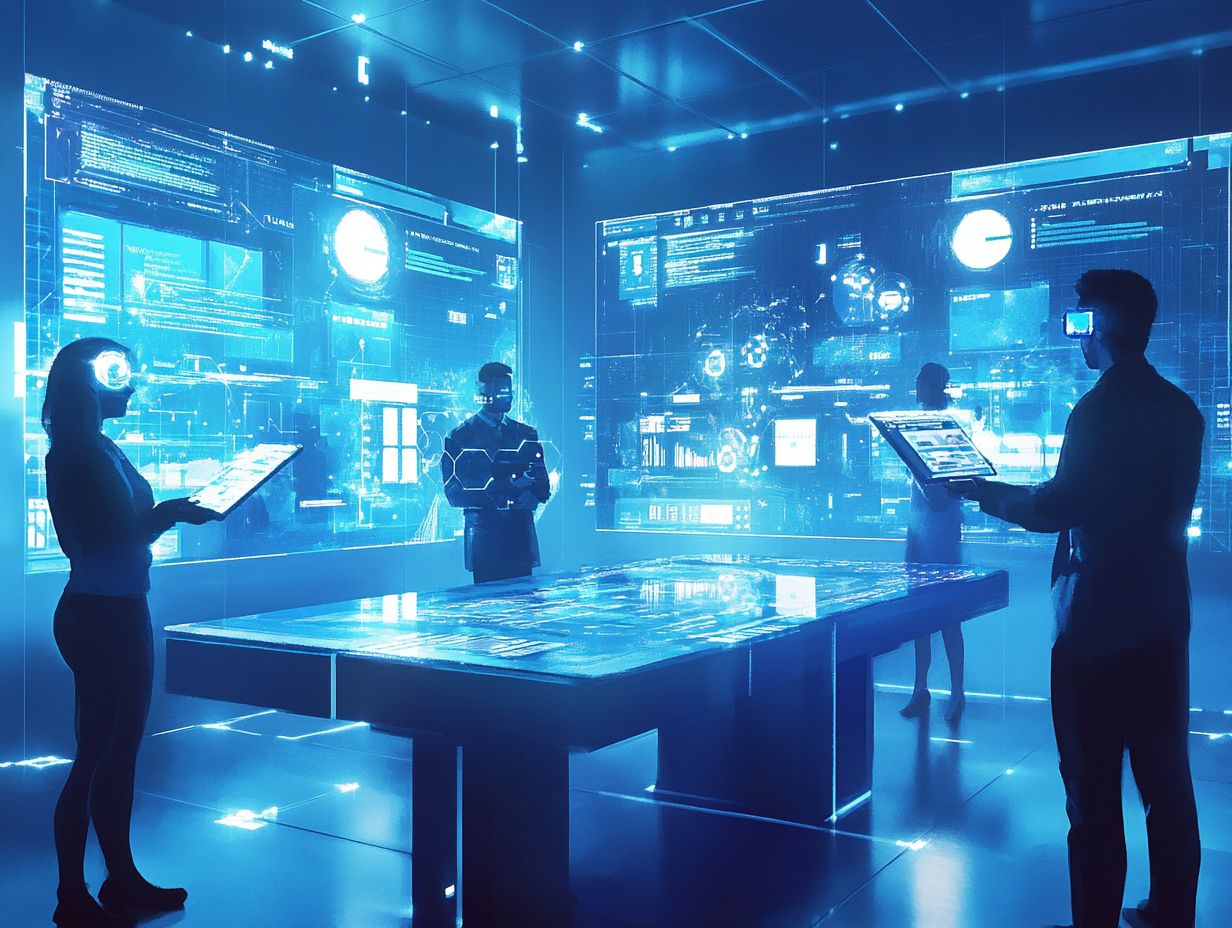The Future of Work in Technology: What to Expect
As technology evolves at an astonishing pace, the future of work is being reshaped in profound ways.
Automation, along with virtual and augmented reality, is not merely enhancing productivity; it s redefining roles and skills across various industries.
This article delves into current trends and predictions, showcasing the in-demand skills of tomorrow while emphasizing the vital role of education in equipping the workforce for this dynamic landscape.
Prepare to navigate the exciting changes that lie ahead!
Contents
- Key Takeaways:
- The Impact of Technology on the Future of Work
- Emerging Technologies in the Workplace
- Changes in Job Roles and Skills
- The Role of Education in Preparing for the Future
- Frequently Asked Questions
- What is the future of work in technology?
- How will AI impact the future of work in technology?
- Will technology eliminate jobs in the future?
- How will remote work be affected by the future of technology?
- What skills will be in demand for the future of work in technology?
- How can individuals prepare for the future of work in technology?
Key Takeaways:

The future of work is heavily influenced by technology. Current trends and predictions point towards further integration and advancements.
Emerging technologies such as AI, automation, and VR/AR are reshaping the workplace and creating new job opportunities. To succeed in the future job market, individuals must adapt to the changing landscape and continuously develop in-demand skills through lifelong learning and education for new technologies.
The Impact of Technology on the Future of Work
The impact of technology on the future of work is nothing short of transformative. It fundamentally reshapes the way industries operate and how you engage in your role.
As you navigate the changes brought on by the pandemic, you’ll notice significant shifts in the US labor market. These are driven by advancements in automation and generative AI, which can create new content, such as text or images.
These shifts are not merely trends; they create new job categories and redefine traditional roles across sectors like healthcare, food services, and e-commerce.
This exciting change opens up new opportunities for all of us! Strong programs to help workers learn new skills are crucial in enabling you to thrive in this dynamic landscape.
Current Trends and Predictions
Current trends in the labor market reveal the profound impact of the pandemic. Job demands are evolving, and there is a noticeable pivot towards remote work and e-commerce as the primary growth sectors.
This transformation has also resulted in an increase in job vacancies, especially within the healthcare sector. The demand for skilled professionals continues to surge as communities seek comprehensive care solutions.
As companies adapt to these changes, a significant portion of the workforce is exploring flexible working arrangements. This contributes to a more diversified employment landscape.
Experts suggest that emerging job categories will likely encompass roles in digital health and cybersecurity. To navigate the complexities of a rapidly evolving world, you ll need to cultivate skills such as technological proficiency, adaptability, and effective communication.
The ongoing shift in employment dynamics underscores not only the resilience required from workers like you but also the critical importance of continuous learning and upskilling.
Emerging Technologies in the Workplace
Emerging technologies like automation and generative AI are revolutionizing the workplace. They open up new avenues for growth and demand that you acquire advanced digital skills across various industries.
Embracing these innovations will not only enhance your career prospects but also empower you to thrive in an ever-evolving landscape.
Artificial Intelligence and Automation

Artificial intelligence and automation are leading the charge in the technological revolution. They enhance efficiencies and transform labor supply across various industries.
However, this progress also sparks valid concerns about job displacement and the pressing need for skill acquisition.
As these technologies weave themselves deeper into sectors like healthcare and manufacturing, you ll notice improvements in productivity due to enhanced accuracy and reduced operational costs.
Yet, this transformation raises urgent questions regarding employment stability; many traditional roles may soon find themselves obsolete.
The potential for considerable workforce disruption calls for immediate action to establish strong programs to help workers learn new skills.
By doing so, you can help ensure that the benefits of technological advancements are distributed fairly, ultimately contributing to sustainable economic growth.
Now is the time to prepare for the exciting changes in the workplace. Start developing your skills today!
Virtual and Augmented Reality
Virtual and augmented reality technologies are making their mark across various industries. They revolutionize training and education by providing immersive experiences that enhance skill development and knowledge acquisition in the workforce.
Take healthcare, for example. These cutting-edge technologies empower medical professionals to practice intricate surgical procedures within a safe environment, minimizing the risks associated with traditional hands-on training.
Similarly, construction firms are using VR and AR to deliver realistic simulations of job sites. This allows workers to become familiar with complex machinery and safety protocols before stepping onto a real site.
As these technologies evolve, experts anticipate deeper integration, paving the way for interactive learning environments that boost employee engagement and retention. This transformation is set to revolutionize training across various fields.
Changes in Job Roles and Skills
Changes in job roles and the required skills are shaped by technological advancements and shifting market demands. There is an increasing focus on digital skills and workforce development initiatives designed to ease job transitions.
In-Demand Skills and Jobs
In today’s labor market, in-demand skills focus on digital proficiency and specialized knowledge. This shift is driven by labor shortages and high demand for skilled professionals.
Opportunities are booming for roles such as:
- Data analysts
- Cybersecurity specialists, who protect information systems from attacks
- Telehealth providers, offering healthcare services remotely
Organizations are eager to adapt to rapid technological advancements, leading to an ongoing need for these skilled workers.
Education and training programs are essential in equipping you with the competencies necessary to excel in these fields. They prepare a workforce capable of meeting the demands of modern industries while providing clear pathways for career advancement.
Adapting to the Changing Landscape

Adapting to the evolving labor landscape demands that you embrace proactive workforce development strategies and skills training programs. These initiatives equip you with essential tools needed to navigate job transitions and thrive in new economic conditions.
As an employer or educational institution, your role is critical in this process. By cultivating an environment where flexibility in work arrangements becomes the norm, you set the stage for success.
Embracing continuous learning opportunities like workshops, online courses, and mentorship programs empowers individuals like you to enhance your skill sets and respond effectively to emerging market demands.
Supportive public policies can build strong frameworks for these transitions, ensuring that the workforce remains resilient and prepared for future challenges.
Don t wait to embrace these learning opportunities. They are your key to thriving in a competitive job market!
The Role of Education in Preparing for the Future
Education is critical for preparing you and the workforce of tomorrow. It equips you with the essential skills and knowledge that align with the demands of the labor market, contributing to economic growth.
Importance of Lifelong Learning
The significance of lifelong learning is paramount in today s dynamic job market. Continuous skill enhancement is crucial for navigating job transitions and fostering economic growth.
By committing to ongoing education, you position yourself to adapt to shifting industry demands and embrace emerging technologies. This proactive mindset cultivates creativity and innovation, enabling you to devise solutions that elevate workplace efficiency.
A variety of programs ranging from online courses on platforms like Coursera and edX to in-person workshops at community colleges empower you to acquire new knowledge at your own pace. Moreover, the networking opportunities and mentorships offered by professional organizations provide invaluable guidance, making your journey of continuous improvement enriching.
Education and Training for New Technologies
Education and training programs must evolve to meet the demands of new technologies. This evolution ensures you possess the digital skills necessary to compete for emerging job openings in a technology-driven economy.
Many educational institutions are already making impressive strides by incorporating advanced technological training into their curricula. For example, several community colleges have rolled out coding boot camps to prepare you for careers in software development.
Universities are weaving artificial intelligence and data analytics into their business programs. This keeps you at the forefront of industry trends.
Google s Career Certificates provide online courses that equip you with critical skills in high demand. These initiatives effectively bridge the skills gap in areas such as IT support and project management.
These efforts empower you to thrive and strengthen the entire workforce, positioning it to flourish in an increasingly digital landscape.
Frequently Asked Questions

What is the future of work in technology?
The future of work in technology is constantly evolving due to advancements in technology. It involves the integration of artificial intelligence, automation, and digitalization into various work processes and industries, highlighting the impact of AI on job markets.
How will AI impact the future of work in technology?
AI is expected to significantly impact the future of work in technology. It will automate repetitive tasks, improve efficiency, and create new job opportunities in fields such as data science and machine learning.
Will technology eliminate jobs in the future?
While technology may replace some jobs, it will also create new ones. By 2030, the global economy is estimated to create about 1.2 billion new jobs due to technological advancements, especially in IT and data analytics.
How will remote work be affected by the future of technology?
The future of technology will enable more remote work opportunities. Advancements in communication and collaboration tools make it easier to work from anywhere, leading to a more flexible work-life balance.
What skills will be in demand for the future of work in technology?
The future of work in technology will require individuals with strong technical skills, such as coding and data analysis. Additionally, having the ability to use technology effectively, adaptability, creativity, and critical thinking will also be essential for success.
How can individuals prepare for the future of work in technology?
To prepare for the future of work in technology, individuals can continue to upskill and stay updated on the latest advancements and trends in their field. Developing a strong foundation in both technical and soft skills is important to stay competitive in the job market.






